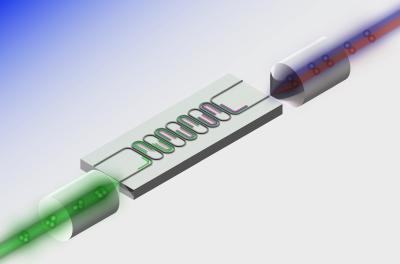In a development that is touted to be a breakthrough in quantum information processing, researchers at University of California in San Diego, the National Institute of Standards and Technology (NIST) and the Politecnico di Milano in Milan, Italy, have demonstrated the first silicon-based heralded single photon source.

Photon pair generation(Credit: Srinivasan, Davanco/NIST)
The device measures 0.5 mm x 0.05 mm in size. It is compatible with existing technology owing to its ability to operate at room temperature to produce photons of wavelength of 1550 nm that align with existing communication systems. It can also be built using standard fabrication methods as it is silicon based. The heralded source could form a complete quantum circuit along with two other recent silicon-based developments, the single photon detector and interferometer for controlling the meshing of photons.
The team based their study on an existing technique called silicon photon pair generation in which the photons are pumped by means of laser beam into a material that results in the generation of another pair of frequency-shifted photons. It is difficult to determine the time of photon generation. However, the detection of one photon announces the existence of the other photon. This is essentially the concept of heralded photons. The photon which is detected is called the herald photon and the photon whose existence is thereby inferred is called the heralded photon. The device is not yet ready for practical applications as the single source is not bright enough. This could be resolved by employing multiple devices with corresponding complementary elements on a single chip. Heralded pairs could serve as information storage mediums in quantum computing.
Disclaimer: The views expressed here are those of the author expressed in their private capacity and do not necessarily represent the views of AZoM.com Limited T/A AZoNetwork the owner and operator of this website. This disclaimer forms part of the Terms and conditions of use of this website.